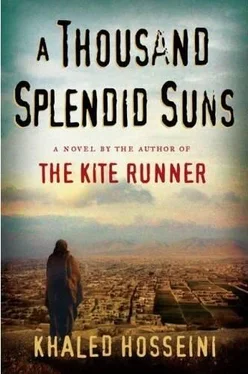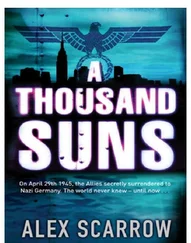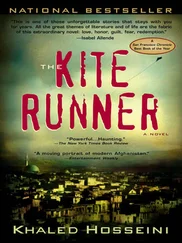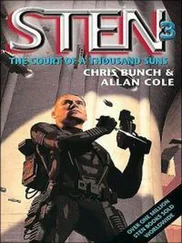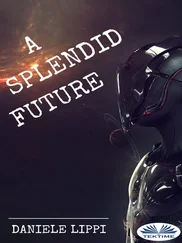Mariam sat down. She tried to make time pass by drawing an elephant in one stroke, the way Jalil had shown her, over and over. She became stiff from all the sitting but wouldn't lie down for fear that her dress would wrinkle.
When the hands finally showed eleven-thirty, Mariam pocketed the eleven pebbles and went outside. On her way to the stream, she saw Nana sitting on a chair, in the shade, beneath the domed roof of a weeping willow. Mariam couldn't tell whether Nana saw her or not.
At the stream, Mariam waited by the spot they had agreed on the day before. In the sky, a few gray, cauliflower-shaped clouds drifted by. Jalil had taught her that gray clouds got their color by being so dense that their top parts absorbed the sunlight and cast their own shadow along the base. That's what you see, Mariam jo, he had said, the dark in their underbelly.
Some time passed.
Mariam went back to the kolba. This time, she walked around the west-facing periphery of the clearing so she wouldn't have to pass by Nana. She checked the clock. It was almost one o'clock.
He's a businessman, Mariam thought. Something has come up.
She went back to the stream and waited awhile longer. Blackbirds circled overhead, dipped into the grass somewhere. She watched a caterpillar inching along the foot of an immature thistle.
She waited until her legs were stiff. This time, she did not go back to the kolba. She rolled up the legs of her trousers to the knees, crossed the stream, and, for the first time in her life, headed down the hill for Herat.
NANA WAS WRONG about Herat too. No one pointed. No one laughed. Mariam walked along noisy, crowded, cypress-lined boulevards, amid a steady stream of pedestrians, bicycle riders, and mule-drawn garis, and no one threw a rock at her. No one called her a harami. Hardly anyone even looked at her. She was, unexpectedly, marvelously, an ordinary person here.
For a while, Mariam stood by an oval-shaped pool in the center of a big park where pebble paths crisscrossed. With wonder, she ran her fingers over the beautiful marble horses that stood along the edge of the pool and gazed down at the water with opaque eyes. She spied on a cluster of boys who were setting sail to paper ships. Mariam saw flowers everywhere, tulips, lilies, petunias, their petals awash in sunlight. People walked along the paths, sat on benches and sipped tea.
Mariam could hardly believe that she was here. Her heart was battering with excitement. She wished Mullah Faizullah could see her now. How daring he would find her. How brave! She gave herself over to the new life that awaited her in this city, a life with a father, with sisters and brothers, a life in which she would love and be loved back, without reservation or agenda, without shame.
Sprightly, she walked back to the wide thoroughfare near the park. She passed old vendors with leathery faces sitting under the shade of plane trees, gazing at her impassively behind pyramids of cherries and mounds of grapes. Barefoot boys gave chase to cars and buses, waving bags of quinces. Mariam stood at a street corner and watched the passersby, unable to understand how they could be so indifferent to the marvels around them.
After a while, she worked up the nerve to ask the elderly owner of a horse-drawn gari if he knew where Jalil, the cinema's owner, lived. The old man had plump cheeks and wore a rainbow-striped chapan. "You're not from Herat, are you?" he said companionably. "Everyone knows where Jalil Khan lives."
"Can you point me?"
He opened a foil-wrapped toffee and said, "Are you alone?"
"Yes."
"Climb on. I'll take you."
"I can't pay you. I don't have any money."
He gave her the toffee. He said he hadn't had a ride in two hours and he was planning on going home anyway. Jalil's house was on the way.
Mariam climbed onto the gari. They rode in silence, side by side. On the way there, Mariam saw herb shops, and open-fronted cubbyholes where shoppers bought oranges and pears, books, shawls, even falcons. Children played marbles in circles drawn in dust. Outside teahouses, on carpet-covered wooden platforms, men drank tea and smoked tobacco from hookahs.
The old man turned onto a wide, conifer-lined street. He brought his horse to a stop at the midway point.
"There. Looks like you're in luck, dokhiarjo. That's his car."
Mariam hopped down. He smiled and rode on.
MARIAM HAD NEVER before touched a car. She ran her fingers along the hood of Jalil's car, which was black, shiny, with glittering wheels in which Mariam saw a flattened, widened version of herself. The seats were made of white leather. Behind the steering wheel, Mariam saw round glass panels with needles behind them.
For a moment, Mariam heard Nana's voice in her head, mocking, dousing the deep-seated glow of her hopes. With shaky legs, Mariam approached the front door of the house. She put her hands on the walls. They were so tall, so foreboding, Jalil's walls. She had to crane her neck to see where the tops of cypress trees protruded over them from the other side. The treetops swayed in the breeze, and she imagined they were nodding their welcome to her. Mariam steadied herself against the waves of dismay passing through her.
A barefoot young woman opened the door. She had a tattoo under her lower lip.
"I'm here to see Jalil Khan. I'm Mariam. His daughter."
A look of confusion crossed the girl's face. Then, a flash of recognition. There was a faint smile on her lips now, and an air of eagerness about her, of anticipation. "Wait here," the girl said quickly.
She closed the door.
A few minutes passed. Then a man opened the door. He was tall and square-shouldered, with sleepy-looking eyes and a calm face.
"I'm Jalil Khan's chauffeur," he said, not unkindly.
"His what?"
"His driver. Jalil Khan is not here."
"I see his car," Mariam said.
"He's away on urgent business."
"When will he be back?"
"He didn't say."
Mariam said she would wait.
He closed the gates. Mariam sat, and drew her knees to her chest. It was early evening already, and she was getting hungry. She ate the gari driver's toffee. A while later, the driver came out again.
"You need to go home now," he said. "It'll be dark in less than an hour."
"I'm used to the dark."
"It'll get cold too. Why don't you let me drive you home? I'll tell him you were here."
Mariam only looked at him.
"I'll take you to a hotel, then. You can sleep comfortably there. We'll see what we can do in the morning."
"Let me in the house."
"I've been instructed not to. Look, no one knows when he's coming back. It could be days."
Mariam crossed her arms.
The driver sighed and looked at her with gentle reproach.
Over the years, Mariam would have ample occasion to think about how things might have turned out if she had let the driver take her back to the kolba. But she didn't. She spent the night outside Jalil's house. She watched the sky darken, the shadows engulf the neighboring housefronts. The tattooed girl brought her some bread and a plate of rice, which Mariam said she didn't want. The girl left it near Mariam. From time to time, Mariam heard footsteps down the street, doors swinging open, muffled greetings. Electric lights came on, and windows glowed dimly. Dogs barked. When she could no longer resist the hunger, Mariam ate the plate of rice and the bread. Then she listened to the crickets chirping from gardens. Overhead, clouds slid past a pale moon.
In the morning, she was shaken awake. Mariam saw that during the night someone had covered her with a blanket.
It was the driver shaking her shoulder.
"This is enough. You've made a scene. Bas. It's time to go."
Читать дальше
